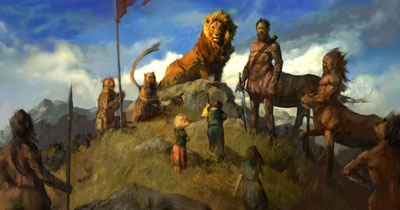
Making film lines out of classic fantasy cycles is becoming de rigeur in Hollywood. Disney's version of The Lion, the Witch and the Wardrobe premiers on Boxing Day, and if it works may be the first instalment in a run of movies based on C. S. Lewis' famous novels. But nothing escapes the Culture Wars these days, and a battle is raging on this side of the wardrobe over Narnia's Christian theology and reactionary social values. The US-based Catholic Outreach has organised a nationwide network to promote the film, while the National Association of Evangelicals has given the production its imprimatur as a tool for, well, evangelising. On the other side of the lists, the progressive intelligentsia has been queuing to condemn it as as "propaganda in the service of a life-hating ideology" (i.e. Christianity), not to mention "the misogyny, the racism, the sado-masochistic relish for violence that permeates the whole [Narnian] cycle."
If there's a flavour of deja vu here, it's because the Rings trilogy provoked similar controversy a few years ago, mainstreaming debates about Tolkien's politics that have smouldered for half a century. Like that of Lewis, Tolkien's creation has a recognisably Christian theological framework and is replete with affronts to the postmodern conscience. A master race which declines as their blood mingles with that of 'lesser men', a virtuous West under assault from Eastern hordes (and southern, = Muslim), stilted and objectifying portrayals of women, the list goes on. Political attacks on The Lord of the Rings invariably shade into sniping at its literary merits, with critics from Edmund Wilson to Germaine Greer laying into the book for every sin from retrograde premodernism to frivolous escapism. It seems that Tolkien and Lewis peddle 'juvenile trash', but trash that's strong enough to indoctrinate children with a regressive belief system.
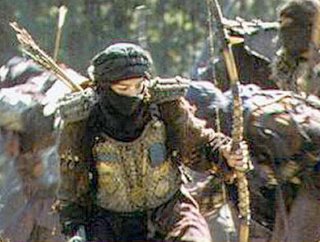 Bad guy
Bad guy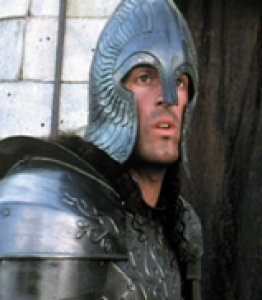
Good guy
All this reveals more about our own civilisation than that of Narnia or Middle Earth. Tolkien's and Lewis' detractors have created the perfect storm in-a-teacup, further cementing the image of progressive intellectuals as short-fused elitists. Likewise, one wonders about the state of Christian ministry when a Disney sword-and-sorcery epic is pressed into service for proselytising. By the same logic congregations should be briefed on Harry Potter, on a 'know-thine-enemy' basis (something that has in fact happened in many evangelical churches). We're hardly fit to condemn Narnia when we've created a society that doesn't leave enough neutral space to read kids a story about fauns and talking animals, and enjoy it as simply a story.
Because, of course, that's what it is. The genre is called 'fantasy' for a reason. Not every work of fiction is a more subliminal version of Animal Farm; some people write for the love of the art, of the creative process. That's why I used to write (before I discovered blogging), a hobby in which I drew much inspiration from childhood readings of Lewis and Tolkien. In any case both authors draw too extensively on pagan references, and are far too creative, for their work to be mere Christian allegory - a characterisation they strongly disclaimed. Lewis desccribed his work as 'suppositional' rather than allegorical:
"If Aslan represented the immaterial Deity in the same way in which Giant Despair represents despair, he would be an allegorical figure. In reality however he is an invention giving an imaginary answer to the question, 'What might Christ become like, if there really were a world like Narnia and He chose to be incarnate and die and rise again in that world as He actually has done in ours?' This is not allegory at all."
Likewise Tolkien, who was perenially irritated by people's efforts to find direct representation in The Lord of the Rings ("To ask if the orcs are communists is to me as sensible as asking if communists are orcs"), preferred to speak of 'applicability' rather than allegory when discussing his creation. He and Lewis were story-tellers foremost, Tolkien having authored a distinguished paper on the subject. Both, however, believed that creative fiction should allow the reader to find points of connection with their own reality. The Lord of the Rings is a tapestry from which one can spin what one desires: greenies indulge themselves in luddism and talking trees, counterculturists take inspiration from the triumph of little people over abstract powers, atavists savour strains of Teutonic mythology. Or one can just appreciate it as the heroic epic that Tolkien wrote it to be. This is different from 'propaganda', which is designed to influence the consumer's opinions.
Likewise Tolkien, who was perenially irritated by people's efforts to find direct representation in The Lord of the Rings ("To ask if the orcs are communists is to me as sensible as asking if communists are orcs"), preferred to speak of 'applicability' rather than allegory when discussing his creation. He and Lewis were story-tellers foremost, Tolkien having authored a distinguished paper on the subject. Both, however, believed that creative fiction should allow the reader to find points of connection with their own reality. The Lord of the Rings is a tapestry from which one can spin what one desires: greenies indulge themselves in luddism and talking trees, counterculturists take inspiration from the triumph of little people over abstract powers, atavists savour strains of Teutonic mythology. Or one can just appreciate it as the heroic epic that Tolkien wrote it to be. This is different from 'propaganda', which is designed to influence the consumer's opinions.
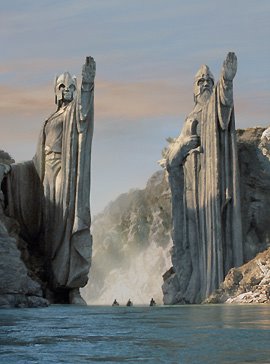 Wagner, anyone?
Wagner, anyone?Where creative fiction is concerned, we ought to defer to the reader's maturity; after all, it has a great deal less potential for harm than many other things we entrust to the everyperson's faculties in a liberal democracy (free speech, voting franchise etc). Otherwise where do we hold the censor's blade? We'd have to cut Bunyan for proselytising, Scott and Dickens for anti-semitism, Defoe for stereotyping native americans. In fact we'd have to condemn literature from any time and culture other than our own, along with a large chunk of contemporary science fiction. From a western liberal viewpoint one can accuse Herbert of promoting atavism, Heinlein fascism and Asimov predestination. And just about everything's wrong with the Warhammer 40,000 universe. But I see no movement to ban WH40K for engenering an intolerant, 'life-hating' social order. Maybe once it transcends the bounds of geekdom, it'll provoke one.
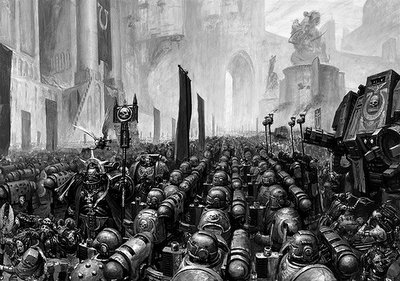
"In conclusion, remember to kill anything that isn't human and worships the Emperor. Trust only bioengineered supermen like yourselves. Hatred is righteousness, difference is heresy and individual life has no value. Right then, let's off on Crusade!"
The Narnia novels expose enough political skin to flay Lewis alive, if progressives want to. Aslan is male, perfect and far from violence-averse ("remember: he's not a tame lion"); the White Witch is female and as misogynistic a character as you'll find in English literature. Only those who keep the faith with Aslan enjoy Narnia's fruits, not to mention getting into Narnian heaven (think Susan Pevensie). Lewis' Calormenes are the most transparent caricature of Ottoman Turks one can imagine - Lewis even uses the Turkish word 'tarkaan' for aristocrats - their religion is a mishmash of the crudest stereotypes of Islam and 'idolatrous' religions, and the last book's fusion cult of 'Tashlan' could have been a custom-designed stab at New Age philosophy and postmodern theological fusion, like that propagated by the current Archbishop of Canterbury, a favourite target of evangelical Christian groups and an advocate of Phillip Pullman's 'anti-Narnia' literary cycle.
I think we're better off rendering to fantasy what is fantasy and to politics what is politics. Call me naive, but I'll trust the average reader to distinguish the historical and mythological references in Lewis and Tolkien - if one picks them up at all, which many don't - from contemporary social commentary. Perhaps the ultimate vindication for these two writers has been their remarkable and apparently evergreen popularity, with The Lord of the Rings famously voted the book of the 20th century. The Inklings may have lost the battle within the literary academy, but outside it they've given the English reading world a permanent gift. Not to mention a major shot in the arm for New Zealand's film and tourist industries.
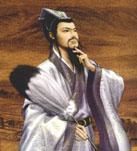
3 comments:
sorry Jeremy, had to redo the post. Here's the text of your comment -
"Hmmm, did you get the memo on 'death of the author'? :)
Sure, tolkein, lewis et al might have just been trying to write harmless escapist fantasy, but that doesn't mean that the work they produced shouldn't be analysed for the semiotics which lurk closely beneath the surface. Now a lot of these are overplayed (like the light/dark thing in the Rings) but I don't think scholarly critiquing of fantasy, per se, is a fruitless exercise. That was the impression I got of what you were saying."
I'm familiar with the 'death of the author' (can't escape it in a liberal arts education these days). The idea that texts can't have intrinsic meaning actually debunks the claim that Lewis' novels carry a conservative political message. To use my metaphor from the post, the reader spins meaning from the text and their existing cultural baggage.
To quote your comment to my last post on deconstructionism, it's a useful tool but if taken too far it paralyses intellectual activity. There's nothing wrong with analysis of Lewis or Tolkien, but to unpackage their work into a set of reactionary political statements effectively destroys it, in search of a chimera. The idea that 'The Lion, the Witch and the Wardrobe' is a trojan horse designed to impress Lewis' worldview on young minds is ridiculous and is typical of the intellectual posturing that puts people off left-wing academics.
Anuway, it's not as if the two authors tried to hide their creative biases. In Lewis the semiotics are bobbing on the surface rather than lurking beneath it. Likewise Tolkien stated that he was out to create a mythology for England and frequently identified the (European) historical and cultural references he drew on, so it should be no surprise that TLOTR expresses a particular cultural outlook.
Does current art give a portent of things to come or does it mirror the current mass mind...or both?
Nice blog.
Post a Comment